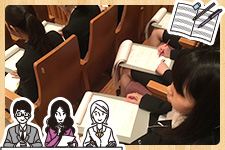Become An Adjudicator To Know How Your Performance Is Evaluated
2018/01/29 | コメント(0)
| トラックバック(0)
|
 Have you ever looked at things from the opposite side? If you want to know how your performance is evaluated, you might be able to realize it if you become an adjudicator. Here are some of the reports about evaluation experiences.
Have you ever looked at things from the opposite side? If you want to know how your performance is evaluated, you might be able to realize it if you become an adjudicator. Here are some of the reports about evaluation experiences.Saki Harada, a student member who worked at the PTNA headquarters as an intern last summer, found it difficult to write her evaluations with easy-to-understand words one after another in a short time. "It is so important to find appropriate expressions and words to each child so that they can understand and enjoy making music more. My piano teacher not only has a variety of words but also a multiple of ideas of practicing. I would like to acquire those skills. After evaluation trial session, 9 attendees of same generation discussed and shared ideas. I realized that we had different ways of expression even if we were talking about the same thing. I think my perspective is widened through this experience."
Another attendee says that this experience enhanced her to do more active listening. "People sometimes give different evaluation even if they listen to the same performance. I find it important to prioritize which point to listen to. Having a good balance between knowledge and experience is the key to improve our listening and evaluation skills."
Kikue Sawada, the organizer of this trial session, explains why she started it. "It all started from a word by a piano teacher. She complained of competitions because they sometimes brought unexpected results, and consequently had a feeling of distrust. I understand how she felt, but I became aware of certain things when I began to serve as an adjudicator. That is why I started this session. I showed a video of the 1st round of the Burgmuller Competition, and asked attendees to write comments and put scores on each performance. Then, we compared those evaluation sheets and discussed the difference between the highest and lowest scores, and observed how it affected to the final judgement, etc. As music has no absolute right answer, evaluation is not an absolute result. One must see the entire forest, not only a tree in front of you. Attendees had a lot of awareness and changed their way of listening. Some had a new perspective when listening, some began to listen to the entire flow of the performance. And everyone realized that adjudicator is such a tough work!"
Then, how do pianists think? Atsushi Kakiuchi, a PTNA authorized member and an associate professor of Elizabeth Music College, realized how adjudicators listen to performances and give advises to pianists. He believes that this experience would help change his mind when playing.
【GoogleAdsense】